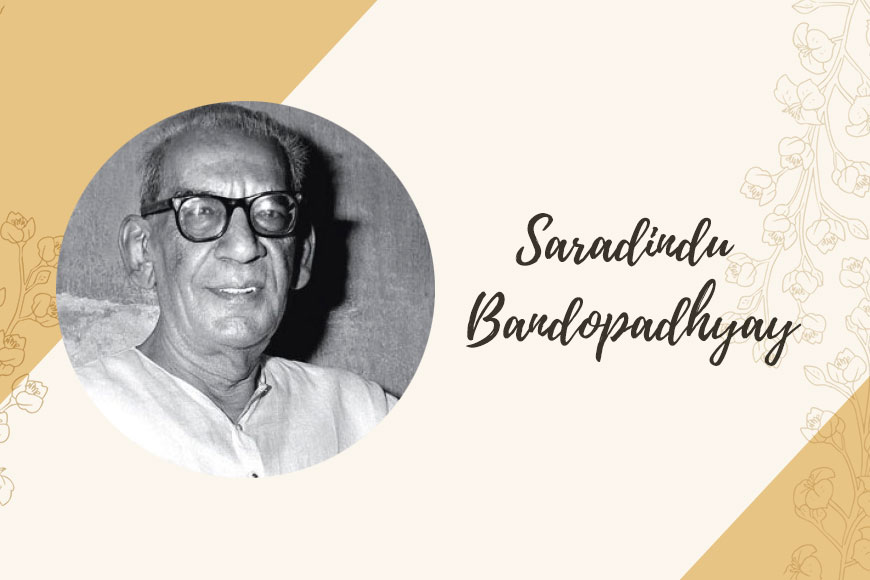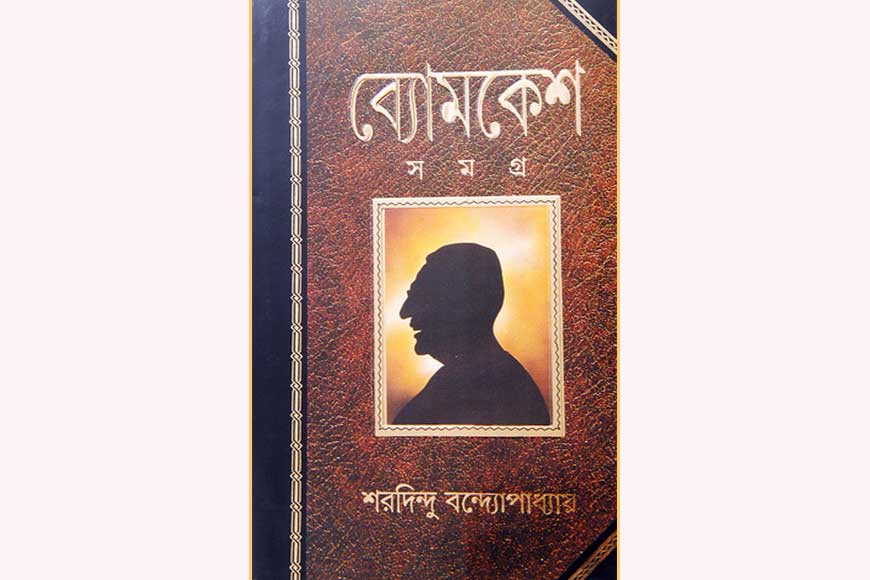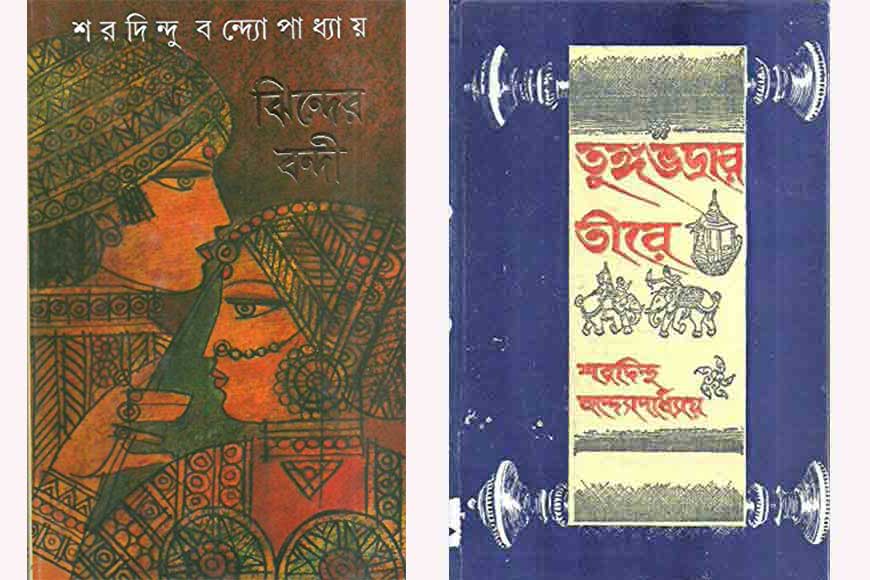Saradindu Bandopadhyay - not just detective Byomkesh, but a master writer of historical novels

‘Among contemporary writers of Bengali – nobody could write a historical fiction quite like him. Who can create that atmosphere, who else has the wit and humour…his prose had a different taste altogether – I am rather fond of it....’ that’s what Sunil Gangopadhyay had to say about Saradindu Bandopadhyay, the very author we usually relate to only detective Byomkesh Bakshi! But he was one who wrote some of the best historical novels of all time.
Saradindu Bandyopadhyay was born in Purnea, Bihar on March 30, 1899 where his father was posted, although his ancestral home was in Baranagar, in North Kolkata. He completed his matriculation in 1915 from a school in Munger, after which he joined the Vidyasagar College in Kolkata. Sisir Bhaduri, the doyen of Bengali stage, was his English professor there. After graduation, he went on to study law in Patna. He was thirty when he gave up his practice and started working as a writer. In 1928, Himangshu Roy invited him to Bombay to write screenplays. Till 1952 he wrote for films, and then settled down in Pune to pursue a full-fledged career as a writer.

Saradindu Bandyopadhyay’s versatility touched along different genre. He was equally at ease with short and long stories. He is primarily known as the creator of Byomkesh Bakshi, the quintessential Bengali detective, whose exploits touched the hearts of not just Bengali readers, but through translations, TV and cinema, of people across India and beyond. The literary brilliance of his historical fiction remains unparalleled. Set in different periods of Indian history, right from the Pre-Aryan days to the Gupta, Mauryan era till the age of the Mughals — they are a unique blend of scintillating twists and turns, of romance, adventure, characters brought to life by a unique idiom and vocabulary to suit the ethos of that bygone era.
Gourmalhar, Tungabhadra’r Teerey, Kaler Mandira and Jheender Bandi, some of the best historical adaptations, where Saradindu himself emphasizes – ‘My stories are not fictionalized history, they are historical fiction.’ Two of the other prominent characters fathered by Saradindu are Sadashiv and Barada. The former is a child hero, and his adventures are a delightful treat for the young readers. Since the writer spent the latter half of his life in Maharashtra, Pune and the Western Ghats form a picturesque backdrop to quite a few of his stories, many of which narrate tales of the Maratha hero, Chhatrapati Shivaji.
Barada, on the other hand, is a ghost-chaser, obsessed with life-after death. He recounts his many encounters with spirits much to the chagrin of his friends. This series of short stories provide great examples of spine-chilling atmosphere and last-minute twists. Saradindu Bandopadhyay’s books continue to be among the bestsellers in Bengali literature.
 Tungabhadrar Teerey and Jheender Bandi
Tungabhadrar Teerey and Jheender Bandi
Here we tried to replicate one of his historical novels Tungabhadrar Teerey that is set around 1430, in the southern Indian Vijayanagar Empire, during the reign of King Devaraya (Deva Raya II, who ruled ca. 1425 to 1446). The story builds around some known facts, such as the threats from Bahmani Sultan, Ahmad Shah and an assassination attempt on the king by his brother. The story focuses on Devaraya getting ready to take a fourth wife, the Princess Bidyunmala of Kalinga, in a strategic alliance. Rather than picking her up himself, however, it is Bidyunmala who travels to her betrothed’s kingdom -- by ship, down the Tungabhadra.
An excerpt:
It’s a long voyage -- over three months -- but at least she has good company, too, her step-sister Manikankana. Still, Bidyunmala isn't necessarily thrilled about what lies ahead, arguing (at least to her step-sister, even while she bows to tradition in public) that: “If a wife cannot have her husband all to herself, marriage is meaningless.”Manikankana, on the other hand, sees things differently:
Bidyunmala sat still, her manner morose. 'Suppose King Devaraya took you as his wife too -- would you be able to love him?' she asked.
Manikankana replied, wide-eyed, 'Not to be able to love him! What do you mean? I would love him more than any of his other wives do. I have all the love in the world to offer. Whoever my husband may be, I will love him with all my heart.'
Of course, for Manikankana, it's only a hypothetical ..... Before they arrive at their final destination they also fish a drowning man out of the river, Arjunvarma, who has escaped his native Gulbarga (in northern Karnataka), fleeing the Muslim invaders.
The arrival of the bridal party does not work out well, a hurricane tearing through just as they approach the shore -- "In an instant, destruction reigned". Among the consequences is that Bidyunmala and Arjunvarma get washed away -- and brought together. They are found soon enough, but Bidyunmala is found to be slightly polluted by having been alone with a man like this, and so the wedding is put on hold for three more months, until she has been cleansed; she certainly welcomes the delay -- having fallen hard for Arjunvarma, and now even less eager to marry the king.
The king is a decent guy, however. He took over for his father, who didn't take to nation-leading, realizing six months into his own reign that: "his culinary career was being hampered" by the day-to-day duties of running an empire and is happier now that he gets to spend all his time in the kitchen. They get along well, but the old man loathes his youngest son, Prince Kampanadeva (a middle son, Vijayaraya, is only interested in warfare, and is conveniently always busy on the front). Even as dad mistrusts Kampanadeva, Devaraya refuses to harbor any suspicions about his younger brother. Dad's instincts are right, however, as devious Kampanadeva carefully plans on how to get his brother and his supporters out of the way in a quick coup.
Arjunvarma proves to have some talents that the king admires, but Bidyunmala's passion for the commoner prove to be problematic. While Arjunvarma is not quite as smitten quite as quickly, he doesn't fight it and a relationship of sorts develops, and that's an affront to the king that, of course, can't be tolerated.
Another of the travelers from Kalinga, Balaram, bonds with Arjunvarma and they become best friends. Balaram also brings some special knowledge with him which the king finds useful, and soon he's helping out as well. When Arjunvarma is banished, however, Balaram goes with his friend -- only for them to encounter a great threat to the kingdom.
Arjunvarma not only brings word of the threat back to the king, he also saves the king from Prince Kampanadeva's dastardly plans. And, while Bidyunmala pouts about being forced into marriage while she loves another it is Manikankana who tends to the king and many of his needs. Happily, a happy -- if slightly contrived solution -- sees to it that everyone gets what (and who) they deserve, right down to the remaining shipwrecked couple, long lost a bit farther downriver.
Bandopadhyay also has Arjunvarma and Balaram bring technological innovations (of sorts) to the kingdom. Arjunvarma's long sticks, which he can use as stilts to get around on very quickly, seem a bit silly, but Balaram's ability to manufacture firearms adds an interesting twist; oddly, it's the sticks that get much more prominent treatment in the story, rather than the true game-changer (though Balaram's prototype does come in very, very handy).
It's a pretty good and often quite exciting story, with a nice mix of romance and adventure which Bandopadhyay balances very well, without getting too caught up in one aspect or another. The fact that there are several (potential) couples, as well as a number of possible threats helps, as Bandopadhyay doesn't bog the story down in any one set of characters or problems. On the other hand, the story doesn't go very much in depth, either, and opts for the easiest solutions -- pretty much everything works out not just well but ideally -- making for a very light tale.










